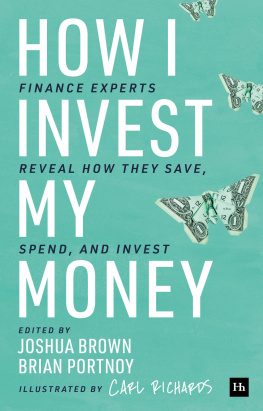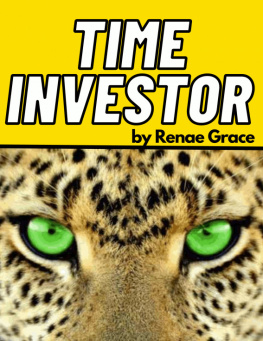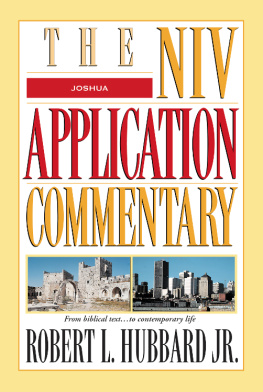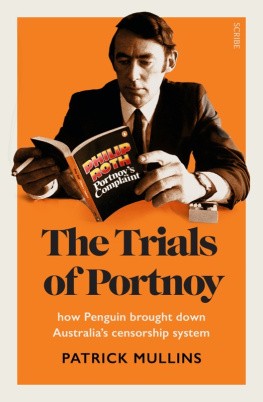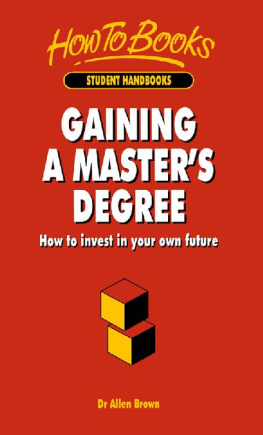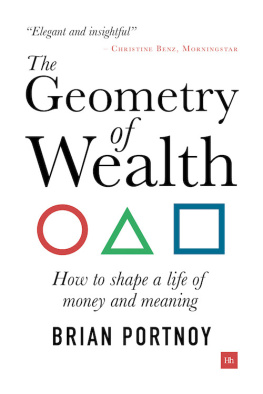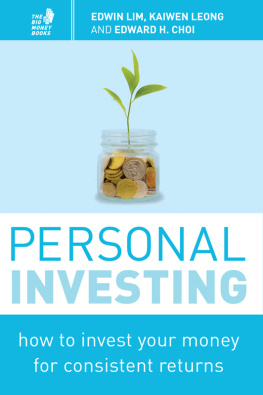Joshua Brown and Brian Portnoy - How I Invest My Money
Here you can read online Joshua Brown and Brian Portnoy - How I Invest My Money full text of the book (entire story) in english for free. Download pdf and epub, get meaning, cover and reviews about this ebook. year: 2020, genre: Home and family. Description of the work, (preface) as well as reviews are available. Best literature library LitArk.com created for fans of good reading and offers a wide selection of genres:
Romance novel
Science fiction
Adventure
Detective
Science
History
Home and family
Prose
Art
Politics
Computer
Non-fiction
Religion
Business
Children
Humor
Choose a favorite category and find really read worthwhile books. Enjoy immersion in the world of imagination, feel the emotions of the characters or learn something new for yourself, make an fascinating discovery.
- Book:How I Invest My Money
- Author:
- Genre:
- Year:2020
- Rating:4 / 5
- Favourites:Add to favourites
- Your mark:
- 80
- 1
- 2
- 3
- 4
- 5
How I Invest My Money: summary, description and annotation
We offer to read an annotation, description, summary or preface (depends on what the author of the book "How I Invest My Money" wrote himself). If you haven't found the necessary information about the book — write in the comments, we will try to find it.
How I Invest My Money — read online for free the complete book (whole text) full work
Below is the text of the book, divided by pages. System saving the place of the last page read, allows you to conveniently read the book "How I Invest My Money" online for free, without having to search again every time where you left off. Put a bookmark, and you can go to the page where you finished reading at any time.
Font size:
Interval:
Bookmark:
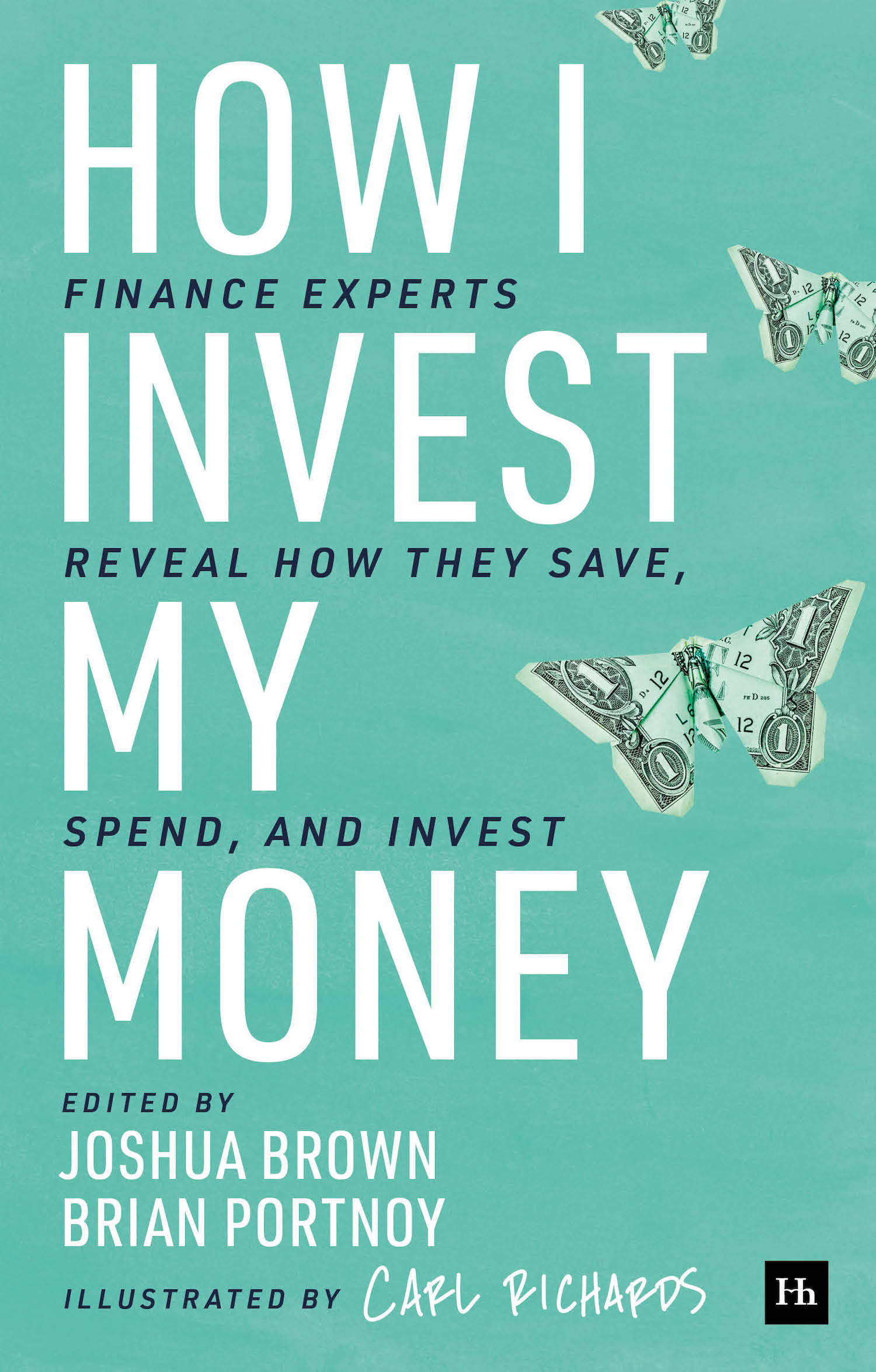
How I Invest My Money
Finance experts reveal how they save, spend, and invest
Edited by Joshua Brown and Brian Portnoy
and illustrated by Carl Richards

Contents
Also by Joshua Brown
Backstage Wall Street
Clash of the Financial Pundits
Also by Brian Portnoy
The Investors Paradox
The Geometry of Wealth
Introduction
I ran the numbers. Ive been appearing on financial television for nine and a half years. During those approximately 114 months, Ive done an average of three shows each week, which works out to something like 1,368 hours of television time talking about the stock market, the bond market, the economy and investing.
And in all of that time, not one person has ever asked me about what I do with my own mone y. Not one.
Ive commented on everything under the sun: Interest rates, valuation multiples, earnings calls, Federal Reserve policies, tax code changes, housing prices, credit spreads, innovation and technology, consumer confidence, trading strategies, small business ownership, macroeconomics, microeconomics, emerging markets, index funds, active management, shareholder activism, real estate investment trusts, volatility, private equity, venture capital, initial public offerings, oil and gas prices, technical analysis, value investing, momentum stocks, smart beta factors, socially responsible investing, social media, biotechnology and drug approvals, presidential elections, geopolitics, natural disasters, defense contractors, gold and silver, cryptocurrency, high frequency trading, Occupy Wall Street, insider trading, analyst upgrades and downgrades, sectors and industries, long-term investing, day trading, hedge funds, mutual funds, exchange traded funds, gaming companies, sports business, show business, startups, bankruptcies, mergers and acquisitions, and I even interview ed 50 Cent.
And in all of that time, not once did someone say, Tell us about how you invest your money.
It neve r happened.
Its not that I didnt enjoy commenting on all of these topics, because I did. But looking back on all that time, and all those words coming out of my mouth, Im amazed that the investing I do with my own money never actua lly came up!
To remedy this, I wrote a post entitled How I Invest My Own Money at The Reformed Broker blog. It was the first time I had ever written at length about how I personally invest, and why I invest the way that I do. The post went viral across all of the social networks I sh ared it to.
Soon after, I got to talking with my co-author and friend Brian Portnoy about the topic and together we came to the realization that we had the makings of something truly exciting on our hands.
We got to thinking about the fact that very few financial professionals have ever written about their own personal finances and investments. We wondered: What if we asked some of our friends and colleagues from around the investing industry about what they do with their own moneyand why? No ones ever really done it before.
Between Brian and I, weve read (and written about) hundreds of books on investing. To the best of our recollection, every one of those books was either advice for what other people should do, or a focus on a particular investment strategy that the author carries out professionally. Even the hallowed Market Wizards series, which we both love, was mostly about how those wizards invested other peop les money .
Indeed, there is no shortage of books on how experts think you ought to invest, but very few of the authors go into detail about whether or not they even take their own advice.
In the pages that follow, you will be reading about investing and money management from a very different perspective. Youll be hearing from some of the most thoughtful and interesting professional investors we know about how they manage their own portfolios.
And more important than the how is the why. During the course of my career, first as a retail broker and then as the CEO of a billion-dollar wealth management firm, I have spoken with thousands of investors, both retail and professional. In that time, I have learned that the reasons why people invest are every bit as important as the names and descriptions of the investments themselves. All of the people in this volume are well-versed in academic investing theories: modern portfolio theory, efficient markets theory, and so forth. But as youll see, everyone is coming from somewhere unique. Everyone has a story to tell and how we invest, save, and spend is one revealing way of telling that story.
A few years back, I had lunch with a wholesaler for one of the largest asset managers in the world and we got to talking about some of his other clients. The firm he worked for is widely known as a large provider of inexpensive index funds. Without naming names, he told me If you only knew how many hedge fund managers keep all of their personal capital in index funds with us that cost only a few basis points, youd be amazed.
I countered that I probably would not be surprised at all. Elaborately allocated and expertly traded portfolios are the quickest route to being able to charge enormous fees. But are they the best solution for those seeking reliable growth and some degree of long-term certainty for their financial futures? Probably not. It made perfect sense to me that people who were already extraordinarily wealthy would want to preserve their wealth using a method very far away from the strategies they use in their professi onal lives.
As Brian and I set out to populate this book, we made a list of people in the investment industry who we admire both personally and professionally. We wanted to hear about the personal portfolios of people from all different corners of the businessfrom venture capital, to financial planning, to asset management, and everything in between. We also wanted to bring our idea to potential contributors whom we knew would be honest, open and willing to share the stories of their lives a nd careers.
I came to a major realization during the course of this project about money, life, and making plans for the future. Ive learned that the reasons behind our individual portfolios and investment choices reveal a lot more about us than we might initi ally think.
Are we too busy helping others to maintain an orderly asset allocation for ourselves?
Are we spending too much time obsessing over formulas, tradeoffs and proportions, to the detriment of remaining focused on the big picture?
Are our personal portfolios an accurate representation of the investment philosophies we espouse in public, or have they deviated from the dogma for one reason or another?
Are we taking more or less risk with our own money than we otherwise would for others? Are we taking redundant risks given the nature o f our work?
Do our holdings contain the remnants of poor judgment from the past? Are we overdue for a little maintenance ourselves?
Are we on the same page as the rest of our families; do we have the same aspirations and objectives for the money when the time comes? Can we even agree on the timing?
Have we learned enough along the way to contradict some of our original ideas about how to invest? Are we growing, or closing our minds off to new ideas?
Are we on autopilot or still asking these difficult questions of ourselves?
Im very excited to share the perspectives and personal stories weve collected for this book from some of the best writers and communicators in the investment business. Brian and I have structured and ordered these chapters in a deliberate way, but we expect many readers to consume them la carte.
Font size:
Interval:
Bookmark:
Similar books «How I Invest My Money»
Look at similar books to How I Invest My Money. We have selected literature similar in name and meaning in the hope of providing readers with more options to find new, interesting, not yet read works.
Discussion, reviews of the book How I Invest My Money and just readers' own opinions. Leave your comments, write what you think about the work, its meaning or the main characters. Specify what exactly you liked and what you didn't like, and why you think so.

